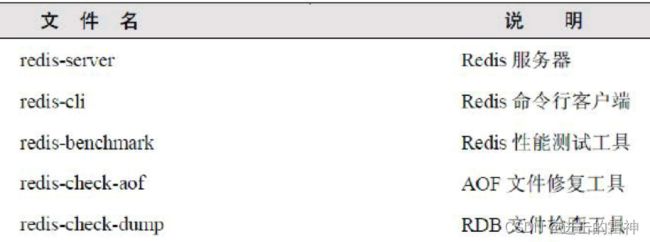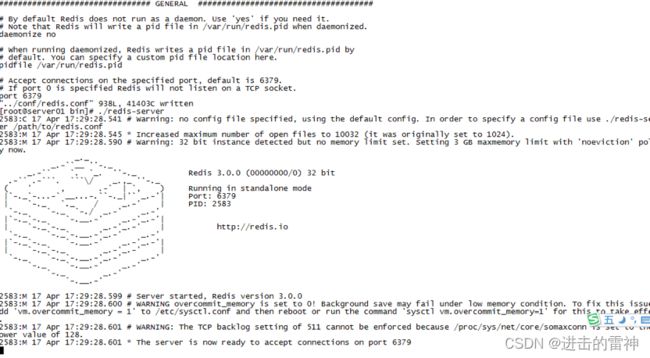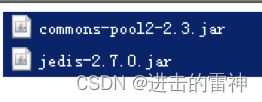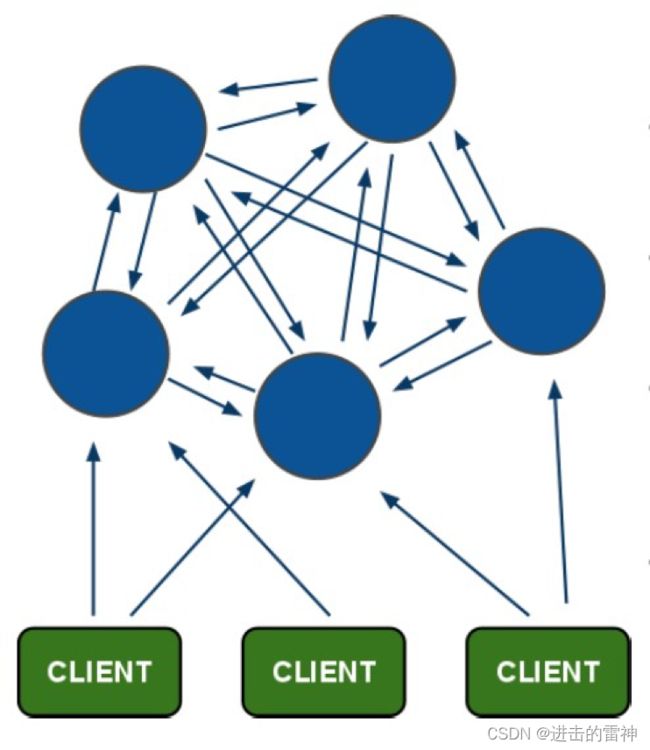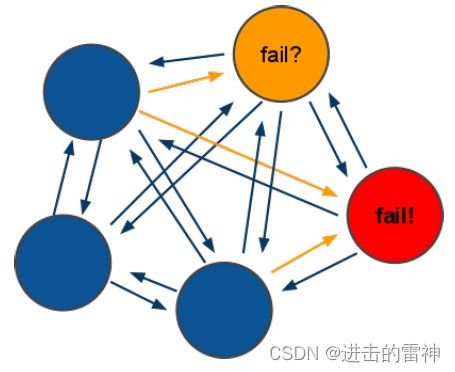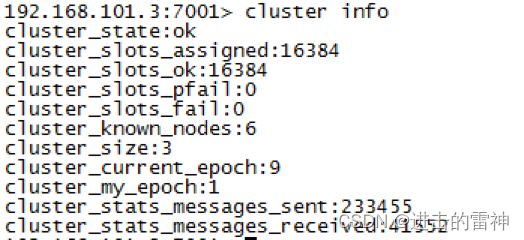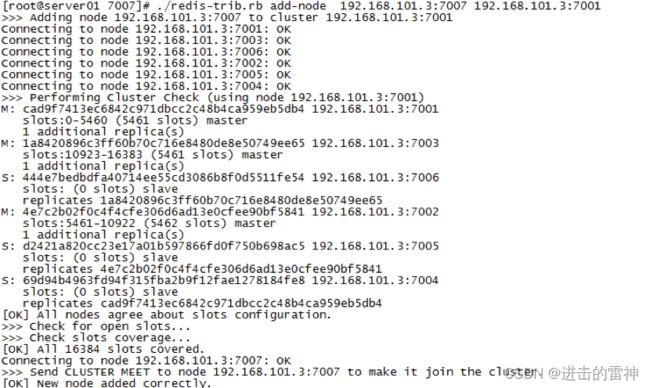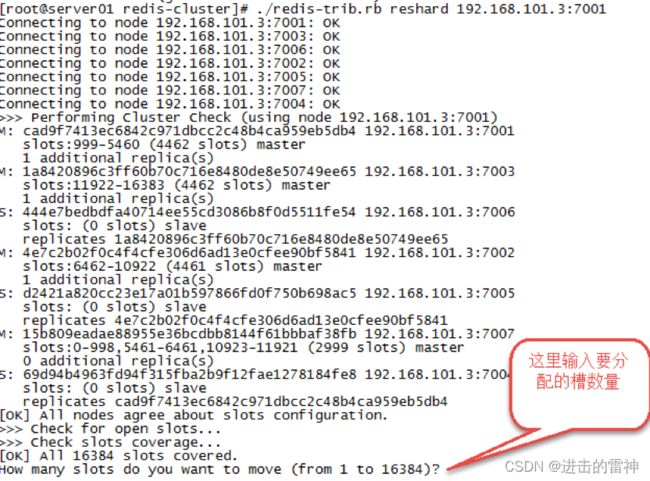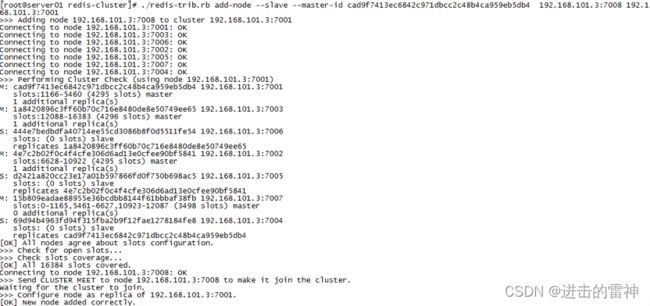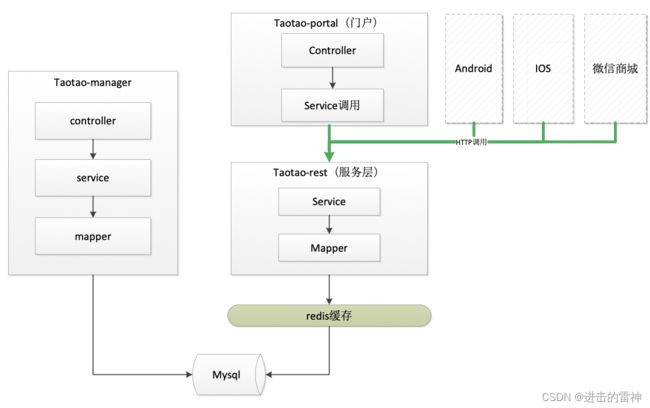redis集群
目录
一、课程计划
二、redis介绍
1、什么是redis
2、redis的应用场景
3、Redis的安装
3.1、版本说明
3.2、源码下载
3.3、解压源码
3.4、进入解压后的目录进行编译
3.5、安装到指定目录,如 /usr/local/redis
3.6、redis.conf
3.7、拷贝配置文件到安装目录下
3.8、安装目录bin下的文件列表
4、redis启动
4.1、前端模式启动
4.2、后端模式启动
5、通过jedis连接redis单机
5.1、jar包
5.2、单实例连接
外部连接不上redis的解决方法
5.3、使用连接池连接
5.4、jedis与spring整合
三、redis集群
1、集群原理
1.1、redis-cluster架构图
1.2、redis-cluster投票:容错
2、ruby环境
3、创建集群
3.1、集群结点规划
3.2、启动每个结点redis服务
3.3、执行创建集群命令
4、查询集群信息
5、添加主节点
5.1、hash槽重新分配
6、添加从节点
7、删除结点:
8、jedisCluster
8.1、测试代码
8.2、使用spring
四、系统添加缓存逻辑
1、添加缓存后系统架构
2、首页大广告位添加缓存
2.1、缓存逻辑
2.2、缓存实现
3、商品分类列表缓存
五、缓存同步
1、同步逻辑分析
2、服务实现
2.1、Mapper
2.2、Service
2.3、Controller
2.4、内容更新逻辑
一、课程计划
- Redis服务搭建
- 为功能添加缓存功
二、redis介绍
1、什么是redis
Redis是用C语言开发的一个开源的高性能键值对(key-value)数据库。它通过提供多种键值数据类型来适应不同场景下的存储需求,目前为止Redis支持的键值数据类型如下:
字符串类型String
散列类型 hashmap
列表类型 list
集合类型
有序集合类型。sortedset
2、redis的应用场景
缓存(数据查询、短连接、新闻内容、商品内容等等)。(最多使用)
分布式集群架构中的session分离。
聊天室的在线好友列表。
任务队列。(秒杀、抢购、12306等等)
应用排行榜。
网站访问统计。
数据过期处理(可以精确到毫秒)
3、Redis的安装
redis是C语言开发,建议在linux上运行,本教程使用Centos6.4作为安装环境。
安装redis需要先将官网下载的源码进行编译,编译依赖gcc环境,如果没有gcc环境,需要安装gcc:
yum install gcc-c++3.1、版本说明
本教程使用redis3.0版本。3.0版本主要增加了redis集群功能。
3.2、源码下载
从官网下载
http://download.redis.io/releases/redis-3.0.0.tar.gz
将redis-3.0.0.tar.gz拷贝到/usr/local下
3.3、解压源码
tar -zxvf redis-3.0.0.tar.gz3.4、进入解压后的目录进行编译
cd /usr/local/redis-3.0.0
make
3.5、安装到指定目录,如 /usr/local/redis
cd /usr/local/redis-3.0.0
make PREFIX=/usr/local/redis install3.6、redis.conf
redis.conf是redis的配置文件,redis.conf在redis源码目录。
注意修改port作为redis进程的端口,port默认6379。
3.7、拷贝配置文件到安装目录下
进入源码目录,里面有一份配置文件 redis.conf,然后将其拷贝到安装路径下
cd /usr/local/redis
mkdir conf
cp /usr/local/redis-3.0.0/redis.conf /usr/local/redis/bin3.8、安装目录bin下的文件列表
redis3.0新增的redis-sentinel是redis集群管理工具可实现高可用。
配置文件目录:
4、redis启动
4.1、前端模式启动
直接运行bin/redis-server将以前端模式启动,前端模式启动的缺点是ssh命令窗口关闭则redis-server程序结束,不推荐使用此方法。如下图:
4.2、后端模式启动
修改redis.conf配置文件, daemonize yes 以后端模式启动。
执行如下命令启动redis:
cd /usr/local/redis
./bin/redis-server ./redis.confredis默认使用6379端口。
![]() 也可更改redis.conf文件,修改端口号:
也可更改redis.conf文件,修改端口号:
5、通过jedis连接redis单机
5.1、jar包
pom坐标:
redis.clients
jedis
2.7.0
jar包如下:
5.2、单实例连接
通过创建单实例jedis对象连接redis服务,如下代码:
// 单实例连接redis
@Test
publicvoid testJedisSingle() {
Jedis jedis = new Jedis("192.168.101.3", 6379);
jedis.set("name", "bar");
String name = jedis.get("name");
System.out.println(name);
jedis.close();
}外部连接不上redis的解决方法
由于linux防火墙默认开启,redis的服务端口6379并不在开放规则之内,所有需要将此端口开放访问或者关闭防火墙。
关闭防火墙命令:
sevice iptables stop如果是修改防火墙规则,可以修改:/etc/sysconfig/iptables文件
5.3、使用连接池连接
通过单实例连接redis不能对redis连接进行共享,可以使用连接池对redis连接进行共享,提高资源利用率,使用jedisPool连接redis服务,如下代码:
@Test
publicvoid pool() {
JedisPoolConfig config = new JedisPoolConfig();
//最大连接数
config.setMaxTotal(30);
//最大连接空闲数
config.setMaxIdle(2);
JedisPool pool = new JedisPool(config, "192.168.101.3", 6379);
Jedis jedis = null;
try {
jedis = pool.getResource();
jedis.set("name", "lisi");
String name = jedis.get("name");
System.out.println(name);
}catch(Exception ex){
ex.printStackTrace();
}finally{
if(jedis != null){
//关闭连接
jedis.close();
}
}
}详细的连接池配置参数参考下节jedis和spring整合中applicationContext.xml的配置内容。
5.4、jedis与spring整合
配置spring配置文件applicationContext.xml
测试代码:
private ApplicationContext applicationContext;
@Before
publicvoid init() {
applicationContext = new ClassPathXmlApplicationContext(
"classpath:applicationContext.xml");
}
@Test
publicvoid testJedisPool() {
JedisPool pool = (JedisPool) applicationContext.getBean("jedisPool");
try {
jedis = pool.getResource();
jedis.set("name", "lisi");
String name = jedis.get("name");
System.out.println(name);
}catch(Exception ex){
ex.printStackTrace();
}finally{
if(jedis != null){
//关闭连接
jedis.close();
}
}
}三、redis集群
1、集群原理
1.1、redis-cluster架构图
架构细节:
(1)所有的redis节点彼此互联(PING-PONG机制),内部使用二进制协议优化传输速度和带宽.
(2)节点的fail是通过集群中超过半数的节点检测失效时才生效.
(3)客户端与redis节点直连,不需要中间proxy层.客户端不需要连接集群所有节点,连接集群中任何一个可用节点即可
(4)redis-cluster把所有的物理节点映射到[0-16383]slot上,cluster 负责维护node<->slot<->value
Redis 集群中内置了 16384 个哈希槽,当需要在 Redis 集群中放置一个 key-value 时,redis 先对 key 使用 crc16 算法算出一个结果,然后把结果对 16384 求余数,这样每个 key 都会对应一个编号在 0-16383 之间的哈希槽,redis 会根据节点数量大致均等的将哈希槽映射到不同的节点
1.2、redis-cluster投票:容错
(1)领着投票过程是集群中所有master参与,如果半数以上master节点与master节点通信超过(cluster-node-timeout),认为当前master节点挂掉.
(2):什么时候整个集群不可用(cluster_state:fail)?
a:如果集群任意master挂掉,且当前master没有slave.集群进入fail状态,也可以理解成集群的slot映射[0-16383]不完成时进入fail状态. ps : redis-3.0.0.rc1加入cluster-require-full-coverage参数,默认关闭,打开集群兼容部分失败.
b:如果集群超过半数以上master挂掉,无论是否有slave集群进入fail状态.
ps:当集群不可用时,所有对集群的操作做都不可用,收到((error) CLUSTERDOWN The cluster is down)错误
2、ruby环境
redis集群管理工具redis-trib.rb依赖ruby环境,首先需要安装ruby环境:
安装ruby
yum install ruby
yum install rubygems安装ruby和redis的接口程序
拷贝redis-3.0.0.gem至/usr/local下
执行:
gem install /usr/local/redis-3.0.0.gem3、创建集群
3.1、集群结点规划
这里在同一台服务器用不同的端口表示不同的redis服务器,如下:
主节点:192.168.101.3:7001 192.168.101.3:7002 192.168.101.3:7003
从节点:192.168.101.3:7004 192.168.101.3:7005 192.168.101.3:7006
在/usr/local下创建redis-cluster目录,其下创建7001、7002。。7006目录,如下:
将redis安装目录bin下的文件拷贝到每个700X目录内,同时将redis源码目录src下的redis-trib.rb拷贝到redis-cluster目录下。
修改每个700X目录下的redis.conf配置文件:
port XXXX
#bind 192.168.101.3
cluster-enabled yes3.2、启动每个结点redis服务
分别进入7001、7002、...7006目录,执行:
./redis-server ./redis.conf查看redis进程:
3.3、执行创建集群命令
执行redis-trib.rb,此脚本是ruby脚本,它依赖ruby环境。
./redis-trib.rb create --replicas 1 192.168.101.3:7001 192.168.101.3:7002 192.168.101.3:7003 192.168.101.3:7004 192.168.101.3:7005 192.168.101.3:7006./redis-trib.rb create --replicas 1 192.168.131.102:7001 192.168.131.102:7002 192.168.131.102:7003 192.168.131.102:7004 192.168.131.102:7005 192.168.131.102:7006说明:
redis集群至少需要3个主节点,每个主节点有一个从节点总共6个节点
replicas指定为1表示每个主节点有一个从节点
注意:
如果执行时报如下错误:
[ERR] Node XXXXXX is not empty. Either the node already knows other nodes (check with CLUSTER NODES) or contains some key in database 0
解决方法是删除生成的配置文件nodes.conf,如果不行则说明现在创建的结点包括了旧集群的结点信息,需要删除redis的持久化文件后再重启redis,比如:appendonly.aof、dump.rdb
创建集群输出如下:
>>> Creating cluster
Connecting to node 192.168.101.3:7001: OK
Connecting to node 192.168.101.3:7002: OK
Connecting to node 192.168.101.3:7003: OK
Connecting to node 192.168.101.3:7004: OK
Connecting to node 192.168.101.3:7005: OK
Connecting to node 192.168.101.3:7006: OK
>>> Performing hash slots allocation on 6 nodes...
Using 3 masters:
192.168.101.3:7001
192.168.101.3:7002
192.168.101.3:7003
Adding replica 192.168.101.3:7004 to 192.168.101.3:7001
Adding replica 192.168.101.3:7005 to 192.168.101.3:7002
Adding replica 192.168.101.3:7006 to 192.168.101.3:7003
M: cad9f7413ec6842c971dbcc2c48b4ca959eb5db4 192.168.101.3:7001
slots:0-5460 (5461 slots) master
M: 4e7c2b02f0c4f4cfe306d6ad13e0cfee90bf5841 192.168.101.3:7002
slots:5461-10922 (5462 slots) master
M: 1a8420896c3ff60b70c716e8480de8e50749ee65 192.168.101.3:7003
slots:10923-16383 (5461 slots) master
S: 69d94b4963fd94f315fba2b9f12fae1278184fe8 192.168.101.3:7004
replicates cad9f7413ec6842c971dbcc2c48b4ca959eb5db4
S: d2421a820cc23e17a01b597866fd0f750b698ac5 192.168.101.3:7005
replicates 4e7c2b02f0c4f4cfe306d6ad13e0cfee90bf5841
S: 444e7bedbdfa40714ee55cd3086b8f0d5511fe54 192.168.101.3:7006
replicates 1a8420896c3ff60b70c716e8480de8e50749ee65
Can I set the above configuration? (type 'yes' to accept): yes
>>> Nodes configuration updated
>>> Assign a different config epoch to each node
>>> Sending CLUSTER MEET messages to join the cluster
Waiting for the cluster to join...
>>> Performing Cluster Check (using node 192.168.101.3:7001)
M: cad9f7413ec6842c971dbcc2c48b4ca959eb5db4 192.168.101.3:7001
slots:0-5460 (5461 slots) master
M: 4e7c2b02f0c4f4cfe306d6ad13e0cfee90bf5841 192.168.101.3:7002
slots:5461-10922 (5462 slots) master
M: 1a8420896c3ff60b70c716e8480de8e50749ee65 192.168.101.3:7003
slots:10923-16383 (5461 slots) master
M: 69d94b4963fd94f315fba2b9f12fae1278184fe8 192.168.101.3:7004
slots: (0 slots) master
replicates cad9f7413ec6842c971dbcc2c48b4ca959eb5db4
M: d2421a820cc23e17a01b597866fd0f750b698ac5 192.168.101.3:7005
slots: (0 slots) master
replicates 4e7c2b02f0c4f4cfe306d6ad13e0cfee90bf5841
M: 444e7bedbdfa40714ee55cd3086b8f0d5511fe54 192.168.101.3:7006
slots: (0 slots) master
replicates 1a8420896c3ff60b70c716e8480de8e50749ee65
[OK] All nodes agree about slots configuration.
>>> Check for open slots...
>>> Check slots coverage...
[OK] All 16384 slots covered.4、查询集群信息
集群创建成功登陆任意redis结点查询集群中的节点情况。
客户端以集群方式登陆:
说明:
./redis-cli -c -h 192.168.101.3 -p 7001 ,其中-c表示以集群方式连接redis,-h指定ip地址,-p指定端口号
cluster nodes 查询集群结点信息
cluster info 查询集群状态信息
5、添加主节点
集群创建成功后可以向集群中添加节点,下面是添加一个master主节点
添加7007结点,参考集群结点规划章节添加一个“7007”目录作为新节点。
执行下边命令:
./redis-trib.rb add-node 192.168.101.3:7007 192.168.101.3:7001查看集群结点发现7007已添加到集群中:
5.1、hash槽重新分配
添加完主节点需要对主节点进行hash槽分配这样该主节才可以存储数据。
redis集群有16384个槽,集群中的每个结点分配自已槽,通过查看集群结点可以看到槽占用情况。
给刚添加的7007结点分配槽:
第一步:连接上集群
./redis-trib.rb reshard 192.168.101.3:7001(连接集群中任意一个可用结点都行)第二步:输入要分配的槽数量
输入 500表示要分配500个槽
第三步:输入接收槽的结点id
这里准备给7007分配槽,通过cluster nodes查看7007结点id为15b809eadae88955e36bcdbb8144f61bbbaf38fb
输入:15b809eadae88955e36bcdbb8144f61bbbaf38fb
第四步:输入源结点id
这里输入all
第五步:输入yes开始移动槽到目标结点id
![]()
6、添加从节点
集群创建成功后可以向集群中添加节点,下面是添加一个slave从节点。
添加7008从结点,将7008作为7007的从结点。
./redis-trib.rb add-node --slave --master-id 主节点id添加节点的ip和端口集群中已存在节点ip和端口执行如下命令:
./redis-trib.rb add-node --slave --master-id cad9f7413ec6842c971dbcc2c48b4ca959eb5db4 192.168.101.3:7008 192.168.101.3:7001cad9f7413ec6842c971dbcc2c48b4ca959eb5db4 是7007结点的id,可通过cluster nodes查看。
注意:如果原来该结点在集群中的配置信息已经生成cluster-config-file指定的配置文件中(如果cluster-config-file没有指定则默认为nodes.conf),这时可能会报错:
[ERR] Node XXXXXX is not empty. Either the node already knows other nodes (check with CLUSTER NODES) or contains some key in database 0
解决方法是删除生成的配置文件nodes.conf,删除后再执行./redis-trib.rb add-node指令
查看集群中的结点,刚添加的7008为7007的从节点:
7、删除结点:
./redis-trib.rb del-node 127.0.0.1:7005 4b45eb75c8b428fbd77ab979b85080146a9bc017删除已经占有hash槽的结点会失败,报错如下:
[ERR] Node 127.0.0.1:7005 is not empty! Reshard data away and try again.
需要将该结点占用的hash槽分配出去(参考hash槽重新分配章节)。
8、jedisCluster
8.1、测试代码
// 连接redis集群
@Test
publicvoid testJedisCluster() {
JedisPoolConfig config = new JedisPoolConfig();
// 最大连接数
config.setMaxTotal(30);
// 最大连接空闲数
config.setMaxIdle(2);
//集群结点
Set jedisClusterNode = new HashSet();
jedisClusterNode.add(new HostAndPort("192.168.101.3", 7001));
jedisClusterNode.add(new HostAndPort("192.168.101.3", 7002));
jedisClusterNode.add(new HostAndPort("192.168.101.3", 7003));
jedisClusterNode.add(new HostAndPort("192.168.101.3", 7004));
jedisClusterNode.add(new HostAndPort("192.168.101.3", 7005));
jedisClusterNode.add(new HostAndPort("192.168.101.3", 7006));
JedisCluster jc = new JedisCluster(jedisClusterNode, config);
JedisCluster jcd = new JedisCluster(jedisClusterNode);
jcd.set("name", "zhangsan");
String value = jcd.get("name");
System.out.println(value);
} 8.2、使用spring
配置applicationContext.xml
测试代码
private ApplicationContext applicationContext;
@Before
publicvoid init() {
applicationContext = new ClassPathXmlApplicationContext(
"classpath:applicationContext.xml");
}
//redis集群
@Test
publicvoid testJedisCluster() {
JedisCluster jedisCluster = (JedisCluster) applicationContext
.getBean("jedisCluster");
jedisCluster.set("name", "zhangsan");
String value = jedisCluster.get("name");
System.out.println(value);
}四、系统添加缓存逻辑
添加缓存逻辑的原则:缓存逻辑不能影响正常的业务逻辑执行。
1、添加缓存后系统架构
2、首页大广告位添加缓存
2.1、缓存逻辑
1)查询内容时先到redis中查询是否有改信息,如果有使用redis中的数据,如果没有查询数据库,然后将数据缓存至redis。返回结果。
2)要添加缓存的位置为:
ContentServiceImpl.java
3)实现步骤
a) 先创建一个key,对应一个hash数据类型
b) 在hash中缓存数据,每条数据对应的key为cid
c) 把内容列表转换成json数据存储。
2.2、缓存实现
@Override
public TaotaoResult getContentList(longcid) throws Exception{
//缓存逻辑,先判断缓存中是否有内容
try {
String contentStr = cluster.hget(TB_CONTENT_KEY, cid + "");
if (!StringUtils.isBlank(contentStr)) {
//把json字符串转换成对象列表
Listlist = JsonUtils.jsonToList(contentStr, TbContent.class);
//返回结果
return TaotaoResult.ok(list);
}
} catch (Exception e) {
e.printStackTrace();
//缓存不能影响正常逻辑
}
//从数据库中加载数据
TbContentExample example = new TbContentExample();
//添加条件
Criteria criteria = example.createCriteria();
criteria.andCategoryIdEqualTo(cid);
Listlist = contentMapper.selectByExample(example);
//把结果添加到redis数据库中
try {
cluster.hset(TB_CONTENT_KEY, cid + "", JsonUtils.objectToJson(list));
} catch (Exception e) {
e.printStackTrace();
//缓存不能影响正常逻辑
}
//返回结果
return TaotaoResult.ok(list);
} 3、商品分类列表缓存
五、缓存同步
1、同步逻辑分析
当数据库中的内容信息发生改变后,例如首页大广告为的广告内容发生变化后,如何实现redis中的数据同步更新呢?可以在taotao-rest工程中发布一个服务,就是专门同步数据用的,其实只需要把缓存中的数据清空即可。当管理后台更新了内容信息后,需要调用此服务。
2、服务实现
2.1、Mapper
此服务不需要mapper内容。只需要JedisCluster对象。
2.2、Service
使用JedisCluster清空对应的cid的内容即可。
@Service
publicclass ClearCacheServiceImpl implements ClearCacheService {
@Autowired
private JedisCluster cluster;
@Value("${TB_CONTENT_KEY}")
private String TB_CONTENT_KEY;
@Override
public TaotaoResult clearContentCache(Long cid) throws Exception {
//删除cid对应的内容
cluster.hdel(TB_CONTENT_KEY, cid.toString());
return TaotaoResult.ok();
}
}2.3、Controller
@Controller
@RequestMapping("/content")
publicclass ContentController {
@Autowired
private ContentService contentService;
@RequestMapping("/category/{cid}")
@ResponseBody
public TaotaoResult getContentList(@PathVariable Long cid) {
TaotaoResult result = null;
try {
result = contentService.getContentList(cid);
} catch (Exception e) {
e.printStackTrace();
return TaotaoResult.build(500, e.getMessage());
}
returnresult;
}
}2.4、内容更新逻辑
更新内容后调用taotao-rest服务清空缓存。

